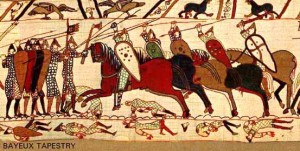Discussion about Anglo Saxon Language is here.English is a Germanic language, from the group of languages to which German, Dutch, Flemish, Danish, Swedish, and Norwegian belong. Its development may be seen in three main periods: Old English from 450 to 1150 (the language of the Anglo-Saxons), Middle English from 1150 to 1500 (the language of the Medieval period), and Modern English from 1500 to the present.
Old English, like Latin and German, was tribes. the Picts, and an inflected language, which means that the words changed their forms to indicate case, gender, number, and tense. As the language developed, it gradually lost its inflection. An example of Old English may be seen in the translation of the Lord’s Prayer.
- Thu ure Fader, the eart on heofenum;
- Si thin noman gehalgod.
- Cume thin rice- Si thin Willa on earthan swa on heofenum;
- Syle us todag orne daegwanlican hlaf,
- And forgif us ure gylter Swa we forgifath tham the with us agylthat;
- And ne laed thus na us on kostnunge;
- Ac alys us fronn yfele. Si bit swa.
Although more than half of our Modern English vocabulary is derived from Latin, either directly or through French or other Romance languages, the Old English words that have survived are basic elements of our vocabulary today and recur frequently because they express basic concepts, such as the following.
Although more than half of our Modern English vocabulary is derived from Latin, either directly or through French or other Romance languages, the Old English words that have survived are basic elements of our vocabulary today and recur frequently because they express basic concepts, such as the following:
Man (mann), Wife (WIT), child (cild). house (hüs), bench (benc), meat. food (mete), grass (gaers), leaf (léaf), fowl, bird (fugol), good (göd), high (héah), strong (strang), eat (etan), drink (drincan), sleep (shüpan), live (libban), fight (feohtan
Old English words and place names took their origin from the Celtic, Latin, and Scandinavian languages. The Celts contributed only a few words like brag, brat, brawl, bump, dad, dagger, fun, job, land, lass, mug, nap, and pet. From the early Roman occupation of Britain and the later coming of Roman missionaries, the Latin language added many words, especially those dealing with commerce, building, religion, and education, such as cup, dish, linen, street, wine, butter, pepper, cheese, cheap, onion, plums, peas, silk, pounds, inch, mile, mint, chalk, copper, pitch, tile, cap, sock, church, creed, demon, bishop, candle, mass, priest, prophet, sabbath, angel, deacon, psalm, school, paper, verse, and our months of the year.
The Scandinavians contributed our pronouns they, their, and them; our nouns band, bank, birth, boon, booth, bunk, bull, crook, dirt. egg, fellow, freckle, gait, gap, guess, keel, kid, leg, mine, race, reindeer, scab, score, scrap, seat, sister, skill, sky, steak, thrift, trust, want, and window; our verbs call, cast, chip, crave, crawl, die, droop, gape, get, give, glitter, lift, tug, nag, rid, scare, screech, snub, sprint, take, thrive, thrust; and our adjectives awkward, flat, ill, loose, meek, muggy, odd, rotten, rugged, scant, sly, tight, and weak. Scandinavian place names are also common.
